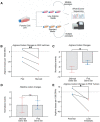This is a preprint.
Arginine limitation causes a directed DNA sequence evolution response in colorectal cancer cells
- PMID: 36711568
- PMCID: PMC9881871
- DOI: 10.1101/2023.01.02.521806
Arginine limitation causes a directed DNA sequence evolution response in colorectal cancer cells
Update in
-
Arginine limitation drives a directed codon-dependent DNA sequence evolution response in colorectal cancer cells.Sci Adv. 2023 Jan 6;9(1):eade9120. doi: 10.1126/sciadv.ade9120. Epub 2023 Jan 6. Sci Adv. 2023. PMID: 36608131 Free PMC article.
Abstract
Utilization of specific codons varies significantly across organisms. Cancer represents a model for understanding DNA sequence evolution and could reveal causal factors underlying codon evolution. We found that across human cancer, arginine codons are frequently mutated to other codons. Moreover, arginine restriction-a feature of tumor microenvironments-is sufficient to induce arginine codon-switching mutations in human colon cancer cells. Such DNA codon switching events encode mutant proteins with arginine residue substitutions. Mechanistically, arginine limitation caused rapid reduction of arginine transfer RNAs and the stalling of ribosomes over arginine codons. Such selective pressure against arginine codon translation induced a proteomic shift towards low arginine codon containing genes, including specific amino acid transporters, and caused mutational evolution away from arginine codons-reducing translational bottlenecks that occurred during arginine starvation. Thus, environmental availability of a specific amino acid can influence DNA sequence evolution away from its cognate codons and generate altered proteins.
Conflict of interest statement
Competing interests: Authors declare that they have no competing interests.
Figures




References
-
- Hershberg R., Petrov D. A., Selection on Codon Bias. Annual Review of Genetics. 42, 287–299 (2008). - PubMed
-
- Alexandrov L. B., Australian Pancreatic Cancer Genome Initiative, ICGC Breast Cancer Consortium, ICGC MMML-Seq Consortium, ICGC PedBrain, Nik-Zainal S., Wedge D. C., Aparicio S. A. J. R., Behjati S., Biankin A. V., Bignell G. R., Bolli N., Borg A., Børresen-Dale A.-L., Boyault S., Burkhardt B., Butler A. P., Caldas C., Davies H. R., Desmedt C., Eils R., Eyfjörd J. E., Foekens J. A., Greaves M., Hosoda F., Hutter B., Ilicic T., Imbeaud S., Imielinski M., Jäger N., Jones D. T. W., Jones D., Knappskog S., Kool M., Lakhani S. R., López-Otín C., Martin S., Munshi N. C., Nakamura H., Northcott P. A., Pajic M., Papaemmanuil E., Paradiso A., Pearson J. V., Puente X. S., Raine K., Ramakrishna M., Richardson A. L., Richter J., Rosenstiel P., Schlesner M., Schumacher T. N., Span P. N., Teague J. W., Totoki Y., Tutt A. N. J., Valdés-Mas R., van Buuren M. M., van ‘t Veer L., Vincent-Salomon A., Waddell N., Yates L. R., Zucman-Rossi J., Andrew Futreal P., McDermott U., Lichter P., Meyerson M., Grimmond S. M., Siebert R., Campo E., Shibata T., Pfister S. M., Campbell P. J., Stratton M. R., Signatures of mutational processes in human cancer. Nature. 500, 415–421 (2013). - PMC - PubMed
-
- Pan M., Reid M. A., Lowman X. H., Kulkarni R. P., Tran T. Q., Liu X., Yang Y., Hernandez-Davies J. E., Rosales K. K., Li H., Hugo W., Song C., Xu X., Schones D. E., Ann D. K., Gradinaru V., Lo R. S., Locasale J. W., Kong M., Regional glutamine deficiency in tumours promotes dedifferentiation through inhibition of histone demethylation. Nat. Cell Biol. 18, 1090–1101 (2016). - PMC - PubMed
Publication types
Grants and funding
LinkOut - more resources
Full Text Sources
